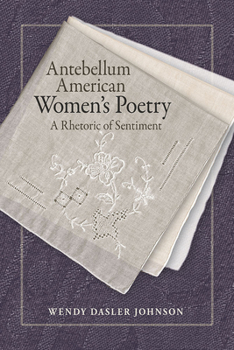Antebellum American Women's Poetry: A Rhetoric of Sentiment
(Part of the Studies in Rhetorics and Feminisms Series)
At a time when a woman speaking before a mixed-gender audience risked acquiring the label "promiscuous," thousands of women presented their views about social or moral issues through sentimental poetry, a blend of affect with intellect that allowed their participation in public debate. Bridging literary and rhetorical histories, traditional and semiotic interpretations, Antebellum American Women's Poetry: A Rhetoric of Sentiment explores an often overlooked, yet significant and persuasive pre-Civil War American discourse. Considering the logos , ethos , and pathos --aims, writing personae, and audience appeal--of poems by African American abolitionist Frances Watkins Harper, working-class prophet Lydia Huntley Sigourney, and feminist socialite Julia Ward Howe, Wendy Dasler Johnson demonstrates that sentimental poetry was an inportant component of antebellum social activism. She articulates the ethos of the poems of Harper, who presents herself as a properly domestic black woman, nevertheless stepping boldly into Northern pulpits to insist slavery be abolished; the poetry of Sigourney, whose speaker is a feisty, working-class, ambiguously gendered prophet; and the works of Howe, who juggles her fame as the reformist "Battle Hymn" lyricist and motherhood of five children with an erotic Continental sentimentalism. Antebellum American Women's Poetry makes a strong case for restoration of a compelling system of persuasion through poetry usually dismissed from studies of rhetoric. This remarkable book will change the way we think about women's rhetoric in the nineteenth century, inviting readers to hear and respond to urgent, muffled appeals for justice in our own day.
Format:Paperback
Language:English
ISBN:080933500X
ISBN13:9780809335008
Release Date:August 2016
Publisher:Southern Illinois University Press
Length:282 Pages
Weight:0.90 lbs.
Dimensions:0.8" x 6.1" x 8.9"
Customer Reviews
0 rating





